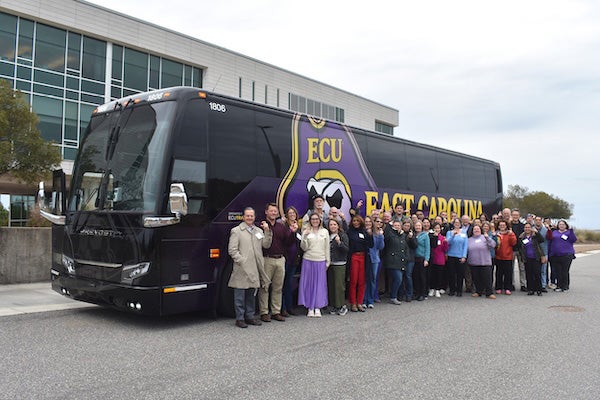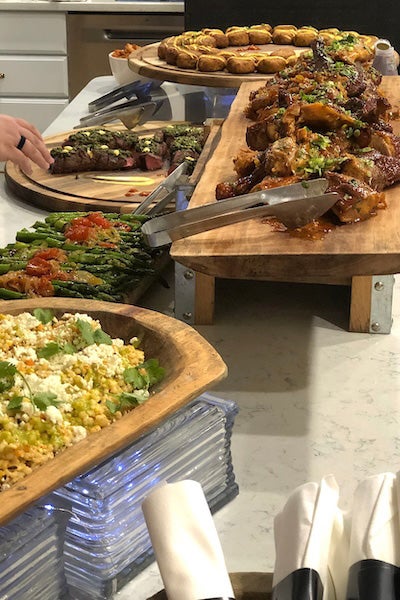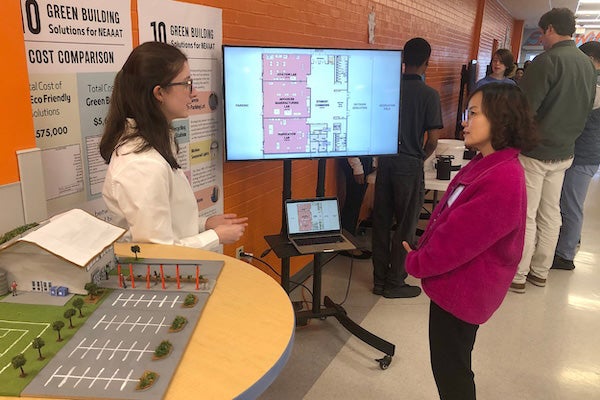Pirates connect with community priorities during bus tour

During ECU’s spring break, 39 faculty and staff traveled across eastern North Carolina, engaging with local leaders and organizations to better understand community needs.
As morning dawned on the first day of East Carolina University’s spring break, 39 faculty and staff members from across campus boarded a Pirate bus for a two-day journey through eastern North Carolina. Now in its eighth year, the Purple and Gold Bus Tour offers participants a firsthand look at the needs, challenges and assets of the university’s 29-county service region.
This year’s tour traveled a northeastern route, winding through six counties between the campus and the coast. Participants engaged with leaders in health care, education, agriculture, economic development, military and other industries to explore opportunities for university-community collaborations aimed at driving meaningful progress.
Led by ECU’s Office of Innovation and Engagement, the immersive experience fosters long-term partnerships that lead to mutually beneficial projects and initiatives.
“The Purple and Gold Bus Tour is an opportunity for faculty and staff to connect with the communities we serve, deepening their understanding of regional strengths and challenges,” said Dr. Sharon Paynter, ECU’s chief innovation and engagement officer and interim chief research officer. “This experience allows us to build partnerships that inform research, scholarship and service in ways that directly impact eastern North Carolina. By engaging with local leaders and organizations, we strengthen ECU’s commitment to student success, public service and regional transformation — ensuring that our work aligns with the priorities of the communities we are dedicated to supporting.”
The tour began at Edgecombe Community College’s Tarboro campus, where participants learned about innovative education and workforce pathways. Local leaders discussed pressing regional issues such as population shifts, unemployment and limited health care access as they look to turn obstacles into opportunities for regional growth.

Guests enjoyed a flavorful plant-based meal featuring fresh, local seafood, crafted by renowned chef Wes Stepp, who partners with Outer Banks Health to create nutritious meals for patients.
Participants then traveled to the Tidewater Research Station in Plymouth, where agricultural researchers are pioneering farming solutions to sustain the continuous need for increased food production.
Moving from the country to the coast, the group ended the first day in Dare County with a visit to Wanchese Industrial Park, a key hub for North Carolina’s seafood and marine industries. Just up the road, the Coastal Studies Institute at ECU’s Outer Banks Campus hosted a panel on ecotourism and environmental resilience, highlighting emerging collaboration opportunities.
That evening, Outer Banks Health hosted a presentation on regional wellness initiatives. Chef Wes Stepp, owner of NC Coast Grill & Bar, introduced guests to Blue Zone principles — lifestyle habits tied to longevity — and served a plant-based meal. The health system also shared how it partners with Stepp to deliver nutritious meals to patients.
The second day began at TCOM in Elizabeth City, where participants learned about tethered aerostat systems — blimp-like surveillance devices used by security and intelligence operations. Down the road from TCOM, the group received an in-depth look at Northeast Academy for Aerospace and Advanced Technologies, a STEM-focused charter school preparing students for careers in aviation, computer science and advanced manufacturing.
In Edenton, Daedalus Yachts introduced the group to zero-emission luxury sailing vessels and cutting-edge marine technologies that could shape a more sustainable boating industry.
The tour wrapped up at Agape Health Services in Williamston, a federally qualified health center serving underserved populations. The center serves a crucial role in expanding health care access across the region.
Throughout the tour, the group met with those who had opened their businesses or moved their companies to eastern North Carolina because of its assets or to address an unmet need. ECU alumni were also front and center, with many leading site visits and showcasing how their education is impacting local communities.
One such alumnus is Troy Tyler, a production engineer at TCOM. Since graduating from ECU in 2019, he has supported mechanical and electrical system production, mentored interns and trained future engineers, many from the rural area.

During a tour of NEEAT, students presented research and creative projects to interested participants.
“My time at ECU prepared me for a career that demands continuous learning and creative problem-solving,” said Tyler. “An aspect of my job I didn’t realize I would love is showing our high school interns how their education applies in real life — like how math helps solve everyday problems. Watching them make those connections has been one of the most rewarding parts of my experience.”
The Purple and Gold Bus Tour not only highlighted the region’s talent and resources but also laid the foundation for future partnerships between ECU and the communities it serves.
“The Purple and Gold Tour was my first large-scale immersion into the ENC29, offering invaluable insight into the communities. A standout moment was visiting Agape Health in Williamston — a prime example of the kind of vital, community-based partnership that fuels our work around vision care and eye health,” said Briana McIntosh, director of research and engagement for the Center for Health Disparities. “Seeing the clinic firsthand and connecting with their team reaffirmed both the persistent challenges patients face and the collaborative opportunities we can build on here at ECU.”
Dr. Warren Gabarée, assistant dean for clinical affairs in the School of Dental Medicine and a recent addition to ECU, said the tour helped him feel more connected to the region and its mission. He also made several connections that could lead to future collaborations.
“Participating in the 2025 Purple and Gold Bus Tour was a transformative experience. As someone new to ECU, it allowed me to feel truly integrated into the broader university community. The tour deepened my understanding of eastern North Carolina, giving me valuable insight into its people, organizations and resources and a clearer sense of how I can contribute to ECU’s mission of regional transformation and rural health. It also sparked meaningful connections that have already led to potential collaborations across departments, with more opportunities on the horizon,” Gabarée said.
The connections made during the tour have the potential to inspire the next wave of impactful partnerships, helping ECU and its communities tackle challenges, improve quality of life and promote lasting prosperity across the region.